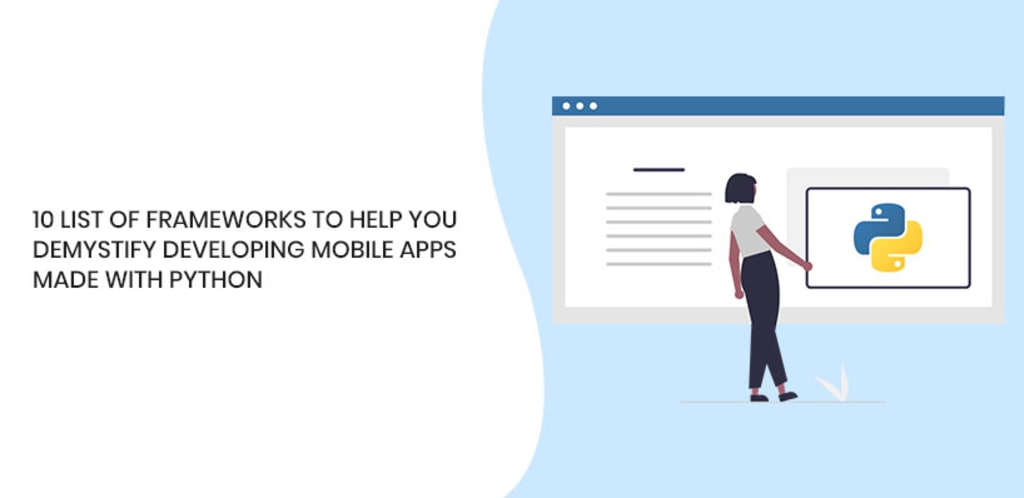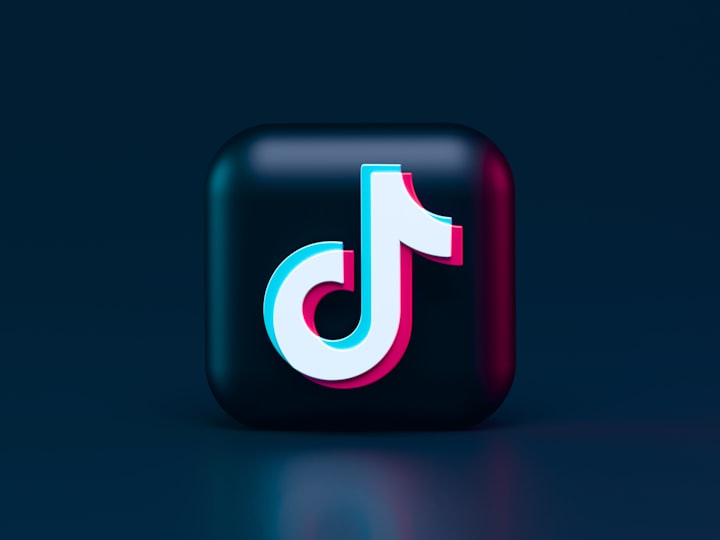10 List of Framework to help you demystify developing mobile apps made with python
We can see that the creation of a python app is quick and flexible.

Technology is constantly evolving. Smartphones, Artificial Intelligence and Machine Learning technologies will continue to improve. To put these technologies to work, we created a variety of tools and apps that can be used by programming languages. Python is one of these languages.
Python is a remarkable programming language, next to JavaScript which is widely used by developers all over the world. We will be discussing the Python Web Frameworks in more detail today. Python has many benefits for developers that result in high-quality output.
Python is the most common programming language used by python developers. It was ranked the best programming language in 2019, surpassing Java's original language. It greatly simplifies the mobile app developmentprocess, earning the title.
Why and What is Python Language for Mobile App Development?
It is free and open-source. This language can be used to create applications for different mobile platforms. Python app development is easy to understand and can be written quickly. It can be used with many languages and works well with large data sets.
Python was developed by Guido van Rossum 30 years ago. It continues to grow in popularity at an incredible rate. The language is backed by a multitude of reliable libraries and frameworks because of its popularity. No wonder adequate tools are available for creating android and iOS apps. A large community has already solved and docked hundreds of issues on sites such as Stack Overflow and Discord.
Many developers can create mobile apps in Python ecosystem. This makes it easy to find skilled personnel or specialists. Python has many libraries and frameworks that make it easy to create code and then run it on multiple mobile platforms (e.g., Android and iOS). Cross-platform development is also known.
Cross-platform programming is an advantage in python's mobile development. Developers used to have to create two completely different versions of an app for Android and iOS app development.
Developers can now use the Kivy and BeeWare frameworks to convert a single line of code into versions that work on iOS, Android or any other platform they choose. This is without needing to create separate mobile and desktop apps.
Types of Python Frameworks
There are basically three types of Python frameworks that can be used for developing mobile apps:
Full-Stack Framework
These frameworks provide a single solution to all developer needs. A typical full-stack framework will usually include form generators, validation forms, and templates layouts.
Microframework
These frameworks are lightweight and don't provide additional functionality and features such as form validation, database abstraction layer, or specific tools and libraries. A microframework requires developers to manually add code and other requirements.
Asynchronous Framework
Asynchronous frameworks are microframework that allow for large numbers of concurrent connections. They have been popular recently. Asynchronous frameworks for Python typically use the asyncio library of Python programming language.
What are the Use Cases for Python?
Let's take a look at different areas where Python can be used:
Automated testing
Many users choose Python for Automated Testing because it prefers to execute the app's features using a script and not manually. Selenium, a web-based automation tool, and Python offer various libraries and tools to run automated tests.
They are also known by the Continuous Integration and Continuous Delivery (CI/CD), tools. They are able to run tests, compile, then publish apps and finally deploy them into production.
Web Crawlers
Web crawlers, also known as Spiderbot are used to duplicate all pages visited on the internet for the final preparation through a search engine. It also indexes downloaded pages for fast searches.
Crawlers can be used to automate site maintenance tasks. It checks links and validates HTML codes.
Because Python has simple code and excellent libraries, it is ideal for creating such Spiderbots.
Web & Software Development
Python has a simple, easy-to-understand programming language that makes it more efficient. Python's ability to integrate with other languages makes it a more attractive option.
Frameworks like Pyramind or Django allow developers to develop Python software and create web apps from scratch. Many internet protocols are supported by the standard Python library, including JSON, XML and HTML.
Image Processing and OCR
The Python Programming Language is renowned for its exceptional image processing and object detection capabilities. PyTesseract (Python Imaging Library), OCR (Optical Character Recognition) and TensorFlow (Object Detection) are all libraries that Python has. Python is highly efficient in developing mobile apps that use computer vision and self-contained deep learning.
Top 10 Python Frameworks for Mobile App Development
Let's take a look at the best python frameworks for mobile app development.
CherryPy
CherryPy is almost ten years old and has proven to be extremely reliable and fast. It is an open-source Python web-development framework that embeds its multi-hung server. It will run on any Python-supporting framework.
You can use any technology to access data, templating, etc. with a moderate web framework. It can handle all the tasks that a web framework can, such as file uploads, session management, cookies, and static files.
CherryPy allows developers to create web apps in the same way as any other object-oriented Python program. This allows for the creation of smaller sources in less time.
Kivy
Kivy is an open-source framework that allows you to create native user interfaces on Android, iOS and BlackBerry 10. It is built using the Python programming language. Kivy lets you create your app once, and then deploy it across all supported platforms using a single code base.
It uses Kivy's widget toolkit, which is a collection of widgets that make it easier to create interactive user interfaces. There are a variety of pre-built widgets such as buttons, check boxes, and text fields. You can also create your own widgets.
BeeWare
BeeWare is another framework for developing mobile apps using graphical user interfaces. It has an abstract layer as part of its framework, and a collection of useful tools to help you create original mobile apps. BeeWare uses the native UI toolkit, which uses elements such as forms, checkboxes and buttons that are provided by the base operating systems.
This allows the app to feel unique on all mobile devices. Both frameworks work well for developing apps that are commercially profitable with high precision. As you probably know, Python can also be used in AI & ML tech stack.
Django
Django is a high-level open-source web framework that uses Python. It encourages rapid development and a simple design. It is also used to create backend web applications that are built on Python language. Django was designed to help users quickly take apps from concept to completion. This tool is also very secure and prevents developers from making common security mistakes.
TurboGears
TurboGears, a webapplicationdevelopment platform, includes SQLAlchemy and Repoze as well as WebOb and other WSGI components. TurboGears, which is built on MVC architecture, allows for fast website creation thanks to its features that enable it to function both as a full-stack and microframework solution with MongoDB first citizen storage.
Pyqtdeploy
Pyqtdeploy does not provide an application development platform. You can package your PyQt app for different platforms (Android, iOS), with a variety of tools. Pyqtdeploy is capable of packaging GUI apps, CLI applications and libraries. You can also use it to build packages for Python apps which don't require PyQt libraries. Pyqtdeploy comes with a BSD license that allows you to use it in commercial projects.
Grok
Grok framework is a web framework that uses the Zope technology. It provides developers with an agile development experience by focusing on two principles: convention over configuration (DRY) and don't repeat yourself. It is an open-source framework that was created to accelerate the development of applications.
As per the task requirements, developers can choose from many independent and network libraries. Grok's user interface (UI) is similar to other full-stack Python frameworks like Turbo Gears and Pylons.
CubicWeb
CubicWeb Type Full-stack framework. CubicWeb was developed and curated in collaboration with Logilab. It is a Python-based, free-to-use semantic web framework that uses open-source Python. CubicWeb is based on the data model and requires that the same be defined to create a functional application.
CubicWeb uses cube, unlike other popular Python frameworks which use separate views or models. Cubic Web uses multiple cubes to create an instance. This is done using a database, a server and configuration files.
Falcon
Micro framework Falcon is another popular Python framework. It's designed to quickly build web APIs. Falcon is a Python framework that does not require developers to load a lot of dependencies in order to build HTTP APIs. Instead, it allows developers create a simpler design that supports both HTTP and REST architectures.
According to Sanic's benchmark test, Falcon can handle most requests using the same hardware as its contemporaries. The Python framework strives to achieve 100% code coverage. Falcon is used by large players such as RackSpace, OpenStack, LinkedIn, and RackSpace.
Giotto
Giotto is a full-stack framework based on the Model View Controller design. Giotto can be used as an application framework for Python. Giotto allows web designers, web developers and system administrators to work in their own way. It separates Model View and Controller elements.
Giotto has controller modules that allow users to create apps over the internet, IRC (Internet Relay Chat) and command line.
The Key Takeaway
We can see that the creation of a Python app is quick and flexible. Python's flexibility allows you to create many types of apps using it. There are many libraries that can be used for different types of apps. This is why Python is preferred by businesses over other languages. It is important to have a team of experts who can offer expert advice on developing an app in Python.
About the Creator
Kuldeep Kundal
Kuldeep Kundal Founder at Developers.Dev which is an Custom development company. Mr. Kuldeep Kundal has expertise in Marketing, People Management, Internal Administration and Research & Development.






Comments
There are no comments for this story
Be the first to respond and start the conversation.